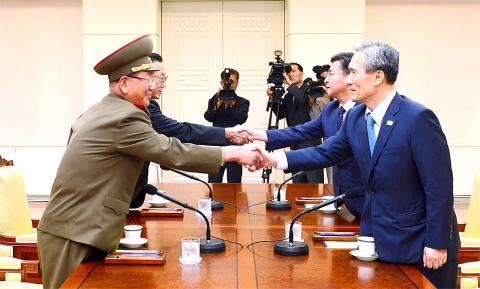Top aides to the leaders of North and South Korea met at the Panmunjom truce village straddling their border yesterday, raising hopes for an end to a standoff that put the rivals on the brink of armed conflict.
The meeting at the demilitarized zone (DMZ) village, known for its sky-blue huts and grim-faced soldiers, was set for half an hour after North Korea’s previously set ultimatum demanding that the South halt its loudspeaker propaganda broadcasts along the border or face military action.
That deadline passed without any reported incidents.

Photo: Reuters
Tension on the Korean Peninsula has been running high since an exchange of artillery fire on Thursday, prompting calls for calm from the UN, the US and North Korea’s only major ally, China. South Korea’s military remained on high alert despite the announced talks, a South Korean Ministry of Defense official said.
South Korean President Park Geun-hye’s national security adviser and her unification minister met North Korean National Defense Commission Vice Chairman Hwang Pyong-so, who is North Korean leader Kim Jong-un’s top military aide, at 6pm.
“The South and the North agreed to hold contact related to the ongoing situation in South-North relations,” Blue House deputy national security adviser Kim Kyou-hyun said in a televised briefing.
Pyongyang on Friday made an initial proposal for a meeting, and Seoul made a revised proposal yesterday seeking Hwang’s attendance, Kim said.
The North’s KCNA news agency also announced the meeting, referring to the South as the Republic of Korea, a rare formal recognition of its rival state, in sharp contrast to the bellicose rhetoric in recent days.
“They need to come up with some sort of an agreement where both sides have saved face. That would be the trick,” Seoul’s Asan Institute for Policy Studies academic James Kim said. “North Korea will probably demand that the broadcasts be cut, and they may even come to an impasse on that issue.”
North Korea, technically still at war with the South after their 1950-53 conflict ended in a truce, not a peace treaty, had declared a “quasi-state of war” in front-line areas and set the deadline for Seoul to halt the broadcasts from loudspeakers placed along the border.
“The situation on the Korean Peninsula is now inching close to the brink of a war due to the reckless provocations made by the South Korean military war hawks,” the North’s KCNA news agency said earlier.
“The fact that these powerful officials who represent South and North Korea’s leaders are meeting means this is a great time to turn the crisis into opportunity,” Seou’s University of North Korean Studies professor Yang Moo-jin said. “It is a breakthrough.”

ACTION PLAN: Taiwan would expand procurement from the US and encourage more companies to invest in the US to deepen bilateral cooperation, Lai said The government would not impose reciprocal tariffs in retaliation against US levies, President William Lai (賴清德) said yesterday, as he announced five strategies to address the issue, including pledging to increase Taiwanese companies’ investments in the US. Lai has in the past few days met with administrative and national security officials, as well as representatives from various industries, to explore countermeasures after US President Donald Trump on Wednesday last week announced a 32 percent duty on Taiwanese imports. In a video released yesterday evening, Lai said that Taiwan would not retaliate against the US with higher tariffs and Taiwanese companies’ commitments to

‘SPECIAL CHANNEL’: Taipei’s most important tasks are to stabilize industries affected by Trump’s trade tariffs and keep negotiations with Washington open, a source said National Security Council Secretary-General Joseph Wu (吳釗燮) arrived in the US for talks with US President Donald Trump’s administration, a source familiar with the matter said on Friday. Wu was leading a delegation for a meeting known as the “special channel,” the Financial Times reported earlier. It marked Trump’s first use of the channel since returning to the White House on Jan. 20. Citing a source familiar with the matter, the Financial Times reported that Minister of Foreign Affairs Lin Chia-lung (林佳龍) was also a part of the delegation. The visit came days after China concluded war games around Taiwan and amid Trump’s

Intelligence agents have recorded 510,000 instances of “controversial information” being spread online by the Chinese Communist Party (CCP) so far this year, the National Security Bureau (NSB) said in a report yesterday, as it warned of artificial intelligence (AI) being employed to generate destabilizing misinformation. The bureau submitted a written report to the Legislative Yuan in preparation for National Security Bureau Director-General Tsai Ming-yen’s (蔡明彥) appearance before the Foreign Affairs and National Defense Committee today. The CCP has been using cognitive warfare to divide Taiwanese society by commenting on controversial issues such as Taiwan Semiconductor Manufacturing Co’s (TSMC, 台積電) investments in the

HELPING HAND: The steering committee of the National Stabilization Fund is expected to hold a meeting to discuss how and when to utilize the fund to help buffer the sell-off The TAIEX plunged 2,065.87 points, or 9.7 percent, to close at 19,232.35 yesterday, the highest single-day percentage loss on record, as investors braced for US President Donald Trump’s tariffs after an extended holiday weekend. Amid the pessimistic atmosphere, 945 listed companies led by large-cap stocks — including Taiwan Semiconductor Manufacturing Co (TSMC, 台積電), Hon Hai Precision Industry Co (鴻海精密) and Largan Precision Co (大立光) — fell by the daily maximum of 10 percent at the close, Taiwan Stock Exchange data showed. The number of listed companies ending limit-down set a new record, the exchange said. The TAIEX plunged by daily maxiumu in just